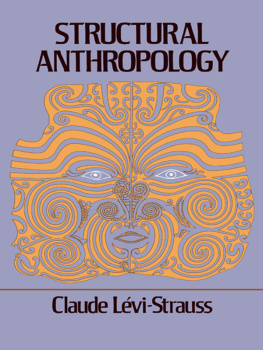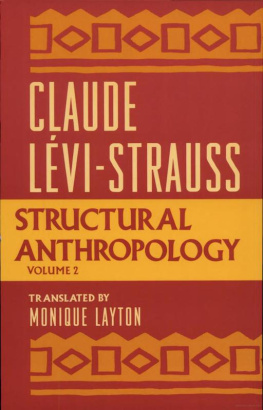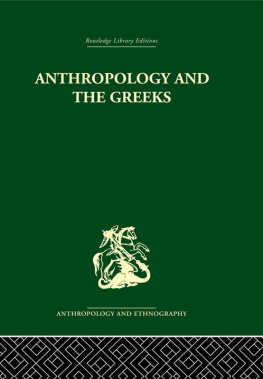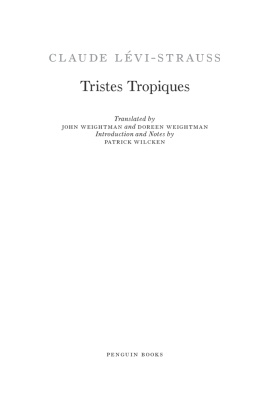Lâevi-Strauss - Structural Anthropology
Here you can read online Lâevi-Strauss - Structural Anthropology full text of the book (entire story) in english for free. Download pdf and epub, get meaning, cover and reviews about this ebook. City: New York, year: 1963;2012, publisher: Basic Books, genre: Politics. Description of the work, (preface) as well as reviews are available. Best literature library LitArk.com created for fans of good reading and offers a wide selection of genres:
Romance novel
Science fiction
Adventure
Detective
Science
History
Home and family
Prose
Art
Politics
Computer
Non-fiction
Religion
Business
Children
Humor
Choose a favorite category and find really read worthwhile books. Enjoy immersion in the world of imagination, feel the emotions of the characters or learn something new for yourself, make an fascinating discovery.
- Book:Structural Anthropology
- Author:
- Publisher:Basic Books
- Genre:
- Year:1963;2012
- City:New York
- Rating:5 / 5
- Favourites:Add to favourites
- Your mark:
- 100
- 1
- 2
- 3
- 4
- 5
Structural Anthropology: summary, description and annotation
We offer to read an annotation, description, summary or preface (depends on what the author of the book "Structural Anthropology" wrote himself). If you haven't found the necessary information about the book — write in the comments, we will try to find it.
Structural Anthropology — read online for free the complete book (whole text) full work
Below is the text of the book, divided by pages. System saving the place of the last page read, allows you to conveniently read the book "Structural Anthropology" online for free, without having to search again every time where you left off. Put a bookmark, and you can go to the page where you finished reading at any time.
Font size:
Interval:
Bookmark:
Anthropology
Translated from the French by Claire Jacobson and Brooke Grundfest Schoepf

Copyright 1963 by Basic Books
Library of Congress Catalog Card Number: 63-17344
ISBN-10: 0-465-09516-X ISBN-13: 978-0-465-09516-2
eBook ISBN: 9780786724437
Printed in the United States of America
May an inconstant disciple dedicate this book which appears in 1958, the year of mile Durkheims centenary, to the memory of the founder of Anne Sociologique: that famed workshop where modern anthropology fashioned part of its tools and which we have abandoned, not so much out of disloyalty as out of the sad conviction that the task would prove too much for us.
Xov v a vos.
I N A RECENT STUDY, Jean Pouillon wrote a sentence which, with his permission, I shall cite at the beginning of this work, since it corresponds perfectly to all that I hoped to accomplish in the scientific realm, though often doubtful of having been successful: Lvi-Strauss is certainly not the first nor the only one to have emphasized the structural character of social phenomena, but his originality consists in taking that character seriously and in serenely deriving all the consequences from it. My hopes would be fulfilled if this book could induce other readers to share this judgment.
One will find here a collection of seventeen of some one hundred papers written during the past thirty years. A few have been lost; others can profitably remain in oblivion. Among those which seemed to me less unworthy of survival, I have made a choice, rejecting works of purely ethnographic and descriptive character, as well as others of theoretical scope, but the substance of which has been incorporated into my book, Tristes Tropiques. Two papers () are published here for the first time in conjunction with fifteen others that seem to me to elucidate the structural method in anthropology....
Jean Pouillon, "LOeuvre de Claude Lvi-Strauss," Les Temps Modernes, XII (1956), 158.
F OR THE PAST DECADE and a half, Claude Lvi-Strauss has been the most influential anthropological theorist in France. He has attracted a large following in Europe and evoked wide interest in the United States. Standing in the mainstream of the French sociological school, he has carried Durkheims and Mausss theories to a totally new level of conceptualization.
This book, first published in France in 1958, is a collection of papers, written between 1944 and 1957, which constitute what Lvi-Strauss regards as his most representative work. More than any of his other writings, Structural Anthropology offers a comprehensive view of Lvi-Strausss theories.
Each of these papers is a self-contained whole in which he applies the structural method to particular problems and data. Lvi-Strauss is primarily concerned with universals, that is, basic social and mental processes of which cultural institutions are the concrete external projections or manifestations. Anthropology should be a science of general principles; the theories which the anthropologist formulates should be applicable to all societies and valid for all possible observers.
Lvi-Strauss has long been one of the chief exponents of the structural method; he considers the relations among phenomena, rather than the nature of the phenomena themselves, and the systems into which these relations enter. He persuasively argues that the attainment of a general science of man is contingent on structural considerations, which must include unconscious as well as conscious social processes, and he time and again develops his thesis in dealing with some of the major aspects of culturelanguage, kinship, social organization, magic, religion, and art.
How does structural analysis proceed? The first step is the definition of the constituent units of an institution; these are conceptually equivalent to the phonemes or morphemes of a language and, therefore, comparable cross-culturally. Once the various aspects of culture have been reduced to their structural elements, relationships of opposition and correlation and permutation and transformation among these elements can be defined. Homologies between institutions within the same society or among various societies can be explained, not in terms of a mechanical causality, but rather in dialectical terms. Correspondences or isomorphisms should be sought, not between empirical data pertaining to different institutions, but between systematized forms, or models, which are abstracted on different levels and which can be compared either intra- or cross-culturally. To Lvi-Strauss, the building of such models is the basic aim of anthropology.
The author proposes bold and at times frankly speculative hypotheses, in which he attempts to relate aspects of culture which no one has previously thought to connect in this particular manner. His originality lies in the emphasis on form, on the primacy of relations over entities, and on the search for constant relationships among phenomena at the most abstract level. His generalizations, however, always depart from empirical observation and return to it. To document his hypotheses, he sifts masses of data pertinent to various aspects of culture and to various societies. Though he deals with the major world areas, his use of ethnographic source materials is highly selective; he employs only those monographs which provide a thorough, intensive, and reliable coverage of a society. In addition, he draws on his own field work in central Brazil, as well as on observations of life in contemporary Western society.
Lvi-Strausss anthropology emphasizes the close relationship between field work and theory, between the description of social phenomena and structural analysis, as two phases of the same process. The ethnographic study of societies must have a concrete, almost microscopic character; fluid, uncrystallized attitudes, the subjective aspects of institutions, must be observed and described with the same care as institutionalized and sanctioned norms and behavior. At the same time, a systematic, comparative, and generalizing perspective must complement the close-range view, so that the patterns which underlie the various manifestations of social life may be uncovered.
Lvi-Strausss approach is holistic and integrative. In this sense, he has not deviated from the major concerns of Boas, Lowie, Kroeber, and other pioneering figures in the field to whom he often refers. He conceives of anthropology in the broadest sense, as the study of man, past and present, in all his aspectsphysical, linguistic, cultural, conscious, and unconscious. In his elaboration of Mausss concept of the total social phenomenon, he is concerned with relating the synchronic to the diachronic, the individual to the cultural, the physiological to the psychological, the objective analysis of institutions to the subjective experience of individuals.
In , Lvi-Strauss outlines his position; he defines the aims, scope, and methods of anthropology and discusses the complementary role of history in providing a perspective to the study of social life. According to him, anthropology has in the past suffered from a surfeit of empiricism on the one hand and culture-bound theorizing on the other. Rejecting the atomistic and mechanistic interpretations of evolutionism and diffusionism, as well as the naturalistic and empirical approach of British functionalism, the author formulates a critique of arbitrary concepts and classifications and exposes fallacious generalizations and truisms extant in much anthropological theory. He returns to this critique in other parts of the book, apropos of specific problems whose analysis and interpretation, he thinks, were misconstrued by his predecessors.
Font size:
Interval:
Bookmark:
Similar books «Structural Anthropology»
Look at similar books to Structural Anthropology. We have selected literature similar in name and meaning in the hope of providing readers with more options to find new, interesting, not yet read works.
Discussion, reviews of the book Structural Anthropology and just readers' own opinions. Leave your comments, write what you think about the work, its meaning or the main characters. Specify what exactly you liked and what you didn't like, and why you think so.










